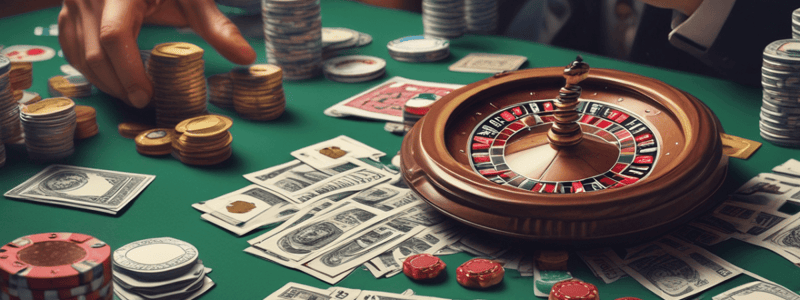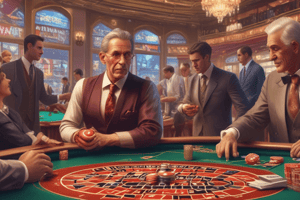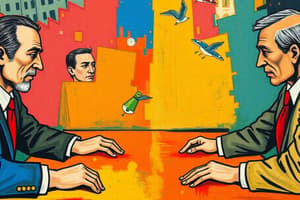Podcast
Questions and Answers
According to conventional economic rules, why should casinos not exist?
According to conventional economic rules, why should casinos not exist?
Casinos should not exist due to the irrationality of humans in gambling, where the odds are in favor of the house.
What percentage chance do players have of losing money in roulette?
What percentage chance do players have of losing money in roulette?
47.4%
How do insurance companies operate similarly to casinos?
How do insurance companies operate similarly to casinos?
Insurance companies bet that customers won't incur more costs than the premiums paid, ensuring a profit margin.
Why is insurance considered a beneficial gamble for both the company and the customer?
Why is insurance considered a beneficial gamble for both the company and the customer?
How does the fear of losing money influence human decision-making in financial matters?
How does the fear of losing money influence human decision-making in financial matters?
What type of risks do humans tend to prefer?
What type of risks do humans tend to prefer?
Why do people often choose to bet on underdogs in sports or gambling scenarios?
Why do people often choose to bet on underdogs in sports or gambling scenarios?
What is the concept of prize-linked savings accounts introduced by economists?
What is the concept of prize-linked savings accounts introduced by economists?
How successful have prize-linked savings accounts been in encouraging people to save?
How successful have prize-linked savings accounts been in encouraging people to save?
What concept do economists use to explain human behavior in gambling and financial decision-making?
What concept do economists use to explain human behavior in gambling and financial decision-making?
What is one reason conventional economic rules suggest that casinos should not exist?
What is one reason conventional economic rules suggest that casinos should not exist?
In roulette, what is the probability of players losing money with zero and double zero slots included?
In roulette, what is the probability of players losing money with zero and double zero slots included?
What encourages people to save in prize-linked savings accounts instead of earning interest?
What encourages people to save in prize-linked savings accounts instead of earning interest?
Why do people often choose to bet on underdogs in sports or gambling scenarios?
Why do people often choose to bet on underdogs in sports or gambling scenarios?
How do insurance companies operate similarly to gambling?
How do insurance companies operate similarly to gambling?
What influences human decision-making in financial matters according to the text?
What influences human decision-making in financial matters according to the text?
What type of risks do humans tend to prefer according to the text?
What type of risks do humans tend to prefer according to the text?
What concept did economists introduce to encourage saving through prize-linked accounts?
What concept did economists introduce to encourage saving through prize-linked accounts?
What is one reason why conventional economic rules suggest that casinos should not exist?
What is one reason why conventional economic rules suggest that casinos should not exist?
What is the approximate chance of losing money for players in roulette, according to the text?
What is the approximate chance of losing money for players in roulette, according to the text?
How do insurance companies operate similarly to casinos, according to the text?
How do insurance companies operate similarly to casinos, according to the text?
What type of risks do humans tend to prefer?
What type of risks do humans tend to prefer?
Why do people often choose to bet on underdogs in sports or gambling scenarios, according to the text?
Why do people often choose to bet on underdogs in sports or gambling scenarios, according to the text?
What concept did economists introduce to encourage people to save, according to the text?
What concept did economists introduce to encourage people to save, according to the text?
How successful have prize-linked savings accounts been in encouraging people to save?
How successful have prize-linked savings accounts been in encouraging people to save?
What concept do economists use to explain human behavior in gambling and financial decision-making, according to the text?
What concept do economists use to explain human behavior in gambling and financial decision-making, according to the text?
Why is insurance considered a beneficial gamble for both the company and the customer?
Why is insurance considered a beneficial gamble for both the company and the customer?
What does the text suggest about human decision-making in financial matters?
What does the text suggest about human decision-making in financial matters?
Flashcards are hidden until you start studying
Study Notes
- Conventional economic rules suggest that casinos should not exist due to the irrationality of humans in gambling, where the odds are in favor of the house.
- Roulette, with zero and double zero slots, creates a 47.4% chance of losing money for players, leading to substantial profits for casinos globally.
- Insurance operates similarly to gambling, where companies bet that customers won't incur more costs than the premiums paid, ensuring a profit margin.
- The fear of losing money outweighs the desire to gain the same amount, making insurance a beneficial gamble for both the company and the customer.
- People generally dislike losing money more than they like winning it, influencing their decision-making in financial matters.
- Humans tend to prefer low-probability risks, such as opting for a small chance of winning a large sum over a certain gain.
- Despite better odds, people often choose to bet on underdogs in sports or gambling scenarios due to a preference for low-probability events with potentially high returns.- Economists introduced the concept of prize-linked savings accounts where instead of earning interest, account holders have a chance to win a larger prize like $5,000 with similar monetary value.
- Prize-linked savings accounts have been successful in encouraging people to save, with 56% of users in Michigan being first-time savers.
- Lotteries operate on similar principles of offering a low chance of winning a large prize, and in some countries, privately run lotteries are illegal.
- In the US, all lotteries are state-run with profits often going towards funding education, essentially making it a form of taxation.
- Gambling activities like lotteries, casinos, or racetracks are designed to guarantee profits for the operators, despite not being favorable deals for bettors.
Studying That Suits You
Use AI to generate personalized quizzes and flashcards to suit your learning preferences.
Description
Explore the economic reasoning behind the profitability of casinos, lotteries, and insurance schemes. Learn how human psychology plays a significant role in decision-making related to financial risks and potential gains.





